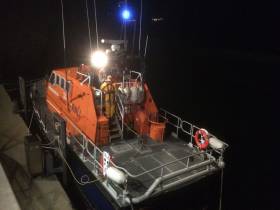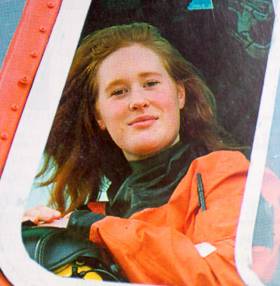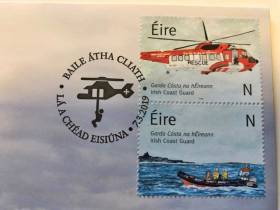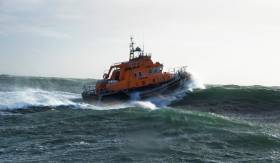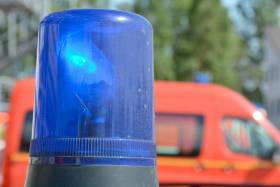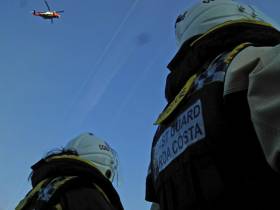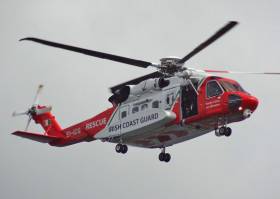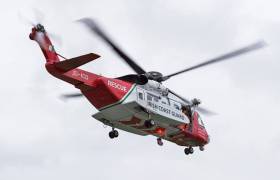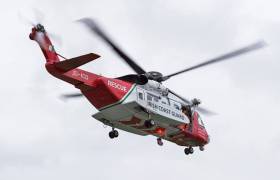Displaying items by tag: Irish Coast Guard
Baltimore Lifeboat In Medical Evacuation From Sherkin Island
#Lifeboats - Baltimore RNLI carried out a medevac on Thursday night (11 April) from Sherkin Island off the coast of West Cork.
The volunteer crew launched their all-weather lifeboat following a request from the Irish Coast Guard at 9.29pm to provide medical assistance and evacuation to an islander living on Sherkin.
Conditions at sea during the callout were calm with good visibility and no sea swell.
The lifeboat arrived at Sherkin pier at 9.45pm, the casualty was brought onboard and the lifeboat departed the island within four minutes, handing the casualty over to the care of HSE ambulance crew at 10.08pm.
Speaking following the callout, Kate Callanan, Baltimore RNLI volunteer lifeboat press officer, said: “Baltimore RNLI regularly provides the vital service of medical evacuations (medevacs) for residents and visitors to local islands such as Sherkin, Cape Clear and Heir.
“If you find yourself in need of medical assistance, call 999 or 112 and ask for the coastguard.”
Elsewhere, volunteer lifeboat crews from the Aran Islands and Galway RNLI participated in a multi-agency training exercise on Galway Bay this week.
The all-weather lifeboat from Aran Islands RNLI and the inshore lifeboat from Galway Bay RNLI were among the many emergency service agencies that took part in a maritime mass rescue exercise.
The scenario training, which saw the lifeboat crew practise an evacuation of survivors from a seagoing ferry in a busy shipping lane, was organised as part of a multi-agency exercise co-ordinated by the Irish Coast Guard.
Among the other agencies involved were the Irish Coast Guard rescue helicopters located at Sligo and Shannon, Doolin/Inisheer Boat Unit, Costello Bay, Killaloe, Kilkee and Cleggan Coast Guard units, Galway Fire Service and the HSE.
Rescue 116 Captain ‘Would Be So Proud’ Of Young Son, Says Sister On Tragedy’s Second Anniversary
An Irish Coast Guard captain lost in the Rescue 116 tragedy two years ago would be “would be so proud of the little boy” her young son has become.
The sister of Capt Dara Fitzpatrick was speaking on RTÉ Radio 1’s Ray D’Arcy Show yesterday afternoon (Wednesday 13 March) on the eve of the second anniversary of the crash that took the lives of Dara and three other coastguard helicopter crew.
Earlier this month two new stamps were issued in tribute to Capt Fitzpatrick, Capt Mark Duffy, winch operator Paul Ormsby and winchman Ciaran Smith as well as coastguard volunteer Caitríona Lucas who died on a rescue mission a few months previously.
Niamh Fitzpatrick said Dara’s son Fionn was only a baby at the time of the incident on 14 March 2017, but until her death “she gave him such a foundation, she’d be so proud of that”.
She added that the family has found the time around the anniversary “tough”, explaining: “It’s shock the first year, with the trauma, as well as grief and it’s almost like you have to deal with that first before you deal with the grief.”
#Coastguard - Two new postage stamps in tribute to the Irish Coast Guard are based on a painting by a volunteer who died in service, as the Sunday Independent reports.
The painting by Caitríona Lucas, who died during a rescue operation off Kilkee in September 2016, has been adapted into a tribute to both her and the crew of the coastguard helicopter Rescue 116 who were lost in March 2017.
Two stamps show separately a rendering of the Sikorsky S-92 helicopter, and an Irish Coast Guard rescue boat similar to what Caitríona had crewed.
The commemorative stamps were launched at the GPO last week by members of the coastguard and Caitríona’s widower Bernard.
In a joint statement, coastguard units in Skerries, Dun Laighaire and Greystones said their thoughts are with the families of Caitríona, Capt Dara Fitzpatrick, Capt Mark Duffy, winch operator Paul Ormsby and winchman Ciaran Smith.
“This gesture by An Post is heartwarming to us all,” they added.
Rosslare Harbour Lifeboat Assists In Evacuation Of Ferry Passenger Taken Ill On Late Night Crossing
#Lifeboats - The RNLI’s all-weather lifeboat based in Rosslare Harbour was launched at 10.38pm on Saturday night (2 March) to assist a passenger onboard an Irish Ferries vessel bound for Pembroke in Wales.
The passenger ferry Oscar Wilde, which was located 20 miles off the Wexford coast at the time, asked for assistance in evacuating a passenger who had become ill.
Sea conditions were unfavourable for the volunteers on the Rosslare Harbour lifeboat to go alongside the ferry.
The Irish Coast Guard helicopter Rescue 117 from Waterford was also tasked and quickly arrived on scene. After attempts to airlift the casualty it was deemed too dangerous.
The Oscar Wilde returned to Rosslare Europort at 1am, where an ambulance was waiting to bring the casualty to hospital. The RNLI volunteers in their Severn class lifeboat stood by the passenger ferry for the duration.
Sea conditions were very poor at the time, with a strong Force 7 to 8 gale and heavy rain.
Coxswain Eamonn O’Rourke commented that the volunteer crew of the lifeboat had to endure very challenging conditions.
Speaking afterwards, Rosslare Harbour RNLI lifeboat operations manager David Maloney said: “Conditions at sea tonight were challenging for our coxswain and lifeboat crew and I would like to commend them for their efforts in enduring a rough passage in the dark, and late at night on a Saturday evening, to be of assistance.”
‘Months’ Before Final Report On Rescue 116 Is Completed
As the second anniversary of the Rescue 116 tragedy approaches, it has emerged that a draft final report into the incident is still months away from completion, according to the Irish Examiner.
The four crew of the Sikorsky S-92 search and rescue helicopter were lost after the crash at Blackrock island off Co Mayo on 14 March 2017.
As previously reported on Afloat.ie, Capt Dara Fitzpatrick died shortly after she was recovered from the scene. The body of Capt Mark Duffy was recovered almost two weeks later. Winch operator Paul Ormsby and winchman Ciaran Smith were lost at sea.
The latest news from the Air Accident Investigation Unit (AAUI) was an interim statement released almost a year agostatement released almost a year ago, which called for “a thorough review of search and rescue aviation operations in Ireland”.
Recommendations from a subsequently commissioned oversight review were accepted by Transport Minister Shane Ross in September last year.
The AAIU has now confirmed that a second interim statement will not be published by 14 March this year, citing work on a draft final report being “at an advanced stage”.
The Irish Examiner has more on the story HERE.
No More Blue Lights & Sirens For Irish Coast Guard Road Vehicles Under New Directive
Irish Coast Guard staff have been ordered to cease their use of blue lights and sirens with their road vehicles when travelling to incidents, as TheJournal.ie reports.
The new directive says risks associated with the use of so-called ‘blues and twos’ by coastguard vehicles “need to be mitigated”.
From now on only those trained to the highest level under the voluntary Emergency Services Driving Standard will be permitted to use lights and sirens when driving.
The directive reportedly makes no mention of any such training being provided to Irish Coast Guard personnel.
The “significant” change has been flagged as a concern by volunteers who fear they could become stuck in traffic when on route to an incident that may be a matter of life and death.
TheJournal.ie has more on the story HERE.
According to the Dept of Transport we’re still a principal emergency service of Ireland. 999 we’ll be there in a while - I know you’re hanging onto a sea cliff, we’re just queuing in tourist traffic at the moment. https://t.co/3qXcOTtCnH
— Robin Blandford (@robinb) February 20, 2019
Waves ‘As High As Two Buses’ During Storm Erik: Irish Coast Guard
Waves as high as two buses battered a Russian vessel off Dingle yesterday (Friday 8 February) as the Irish Coast Guard launched a double rescue during Storm Erik.
BreakingNews.ie reports on comments made by coastguard divisional controller Derek Flanagan regarding its operations to assist the Russian ship with 91 people on board, which has list power 230 miles south-west of the Kerry port town — as well as an Irish fishing vessel 120 miles west of Dingle that suffered significant damage after a large wave strike.
“Our biggest concern is the danger that these waves represent to the vessels; the likelihood of injury to crews working aboard these vessels is increased quite a lot as they try to contend with those weather conditions,” said Flanagan, who noted that the 10-metre seas faced by the Russian crew were “probably as high as too buses together”.
BreakingNews.ie has more on the story HERE.
Coastguard Airlifts Two Injured Crew From Fishing Vessel Off Kerry
Two crew members with suspected head injuries were airlifted from a fishing vessel off Dingle yesterday (Tuesday 29 January), as the Irish Examiner reports.
The Irish Coast Guard’s Shannon-based helicopter Rescue 115 was tasked to the scene some 60 nautical miles west of Co Kerry in poor weather conditions, with winds of up to Force 6.
Both fishing crew were transferred by the coastguard to University Hospital Limerick for treatment, and it is understood there conditions are not life-threatening.
Industrial Action By Coastguard Pilots Deferred For ‘Further Engagement’
Industrial action by Irish Coast Guard search and rescue pilots scheduled to begin yesterday (Thursday 24 January) has been called off to allow for further talks, as TheJournal.ie reports.
Pilots have sat down with coastguard helicopter operator CHC Ireland a number of times this week to find a resolution to a long-running dispute over rostering hours.
In a letter to the Labour Court yesterday, Brendan O’Hanlon of trade union Fórsa, whose branch Ialpa represents the pilots, wrote: “Following local last-minute discussions designated to avert the pending action, it has been agreed to defer any action to allow further engagement.”
TheJournal.ie has more on the story HERE.
Coastguard Helicopter Pilots Plan Work-To-Rule Over Roster Dispute
The Irish Times reports that helicopter search and rescue pilots with the Irish Coast Guard are to take industrial action from Thursday (24 January) in a dispute over rostering hours.
Brendan O’Hanlon of trade union Fórsa, whose branch Ialpa represents the pilots, said the issues had been an “ongoing problem” for 18 months and that the SAR service “is over-reliant on overtime in order to maintain the level required”.
CHC Ireland, which operates the service, says it has the full compliment of coastguard pilots needed to operate.
From noon on Thursday pilots are set to engage in work-to-rule action, meaning they will work a fixed pattern of six days of work, including three 24-hour shifts, followed by three days off.
The Irish Times has more on the story HERE.



























